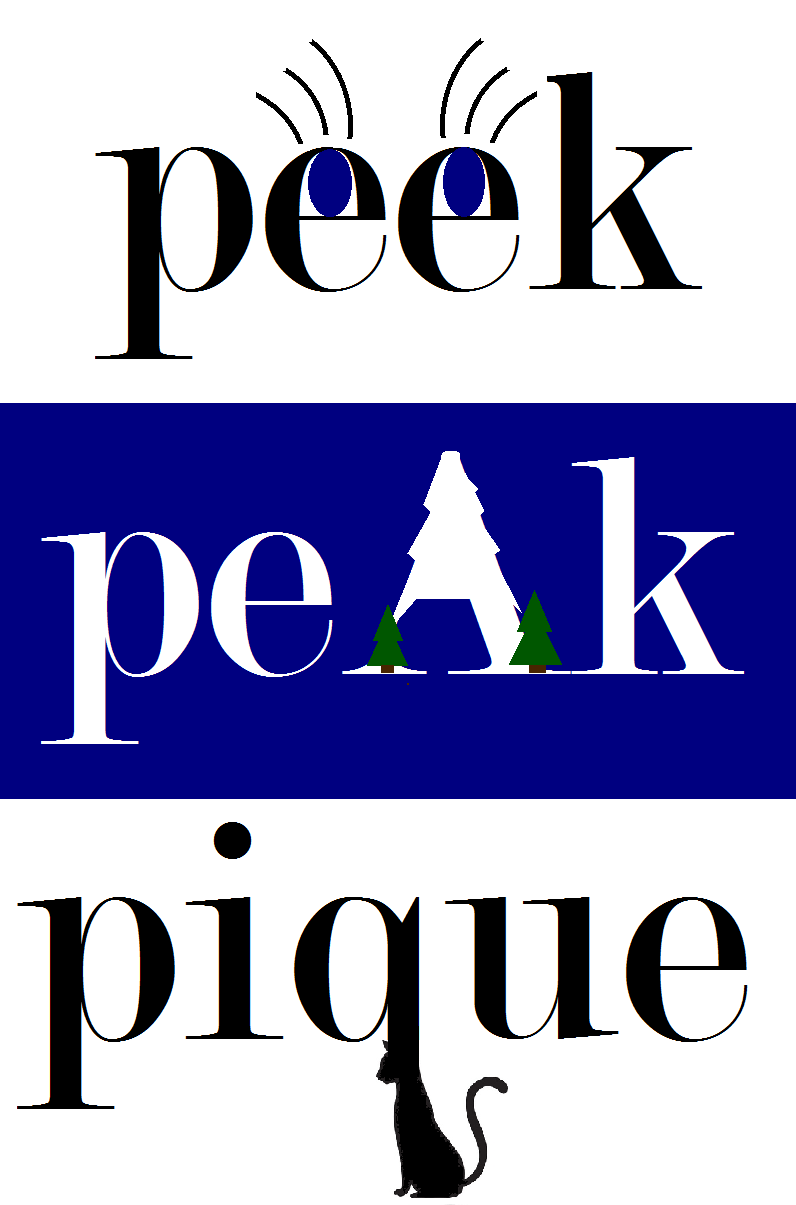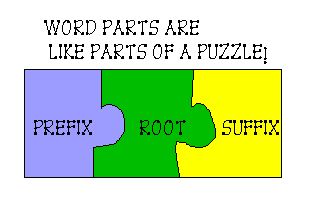by Donna | May 29, 2013
 |
| Picture by Lisa Rivera |
|
|
Oh my word! My tips and tricks for peek, peak, and pique aren’t nearly as cute and memorable as the ones Lisa Rivera has created in the picture above! In our curriculum materials, and on the web, I don’t have access to that kind of graphic representation of words. I might have to look into that in the future!
In the meantime, her picture says a thousand words–okay, well really just three:
1. Peek
a. Verb meaning a secretive look–And then I am going to peek into the package.
b. Noun meaning a small glance–She took a peek into the package.
c. Thus, the two EYES in the middle of the word peek in the graphic. (We do have that in our books, but we just tell it not show it–showing it is so much better!)
2. Peak
a. Verb meaning to reach the highest point—They said that the dancer was going to peak at just the right time.
b. Noun meaning the highest point—They reached the mountain’s peak.
c. Adjective meaning highest point—They were at their peak performance.
d. Love the graphic with the A being a high, mountainous point.
3. Pique’
a. Verb meaning to arouse curiosity–They really tried to pique’ our attention with those pictures.
b. Noun meaning resentment–He slammed the door in a fit of pique’. (Use it interchangeably with “quick anger.”
c. Noun or adjective meaning nubby fabric–He wore his pique’ bright yellow polo shirt.
d. The verb is the most common meaning; and thus, we see the cat at the bottom of the q in the picture because “curiosity killed the cat.” CLEVER!
If you don’t have that great picture above, here are ways to remember these three:
1. Peek–has two e’s, and we have two eyes and peek with our eyes
2. Peak—not two e’s OR They have a lEAK in the pEAK of their roof.
3. Pique’–Ends with que—question begins with que
Happy Wordy Wednesday! If you like our blog, share it with others! Put the FB link on your timeline, so others can learn with Language Lady each week! Smile…
by Donna | May 15, 2013
In my complete language arts books, I have a weekly lesson called “Wacky Words.” When I began writing language arts books for a different publisher fourteen years ago, I did not have this section in my books.
Then I began testing…and testing…and testing…my materials. As I tested them, I discovered that even mature writers have difficulties with homophones (words that sound the same but are spelled differently and have different meanings). Then along came message boards, email groups, and FaceBook, and I discovered EVERYBODY has trouble with homophones. From these experiences, the Wacky Word lessons were born.
This week I was thinking of the plays that our daughter is directing for a community youth program called The Young Playwrights. I have seen the word playwrights before, but this week, it struck me that we do not have that word in our Wacky Word lessons with write, right, and rite.
Then, of course, I thought more (thinking is what I do!) and wondered why, if the children are writing plays, the term is not playwrite. So…that takes us to this Wordy Wednesday/Wacky Word post!
The picture above gives us some idea of why the word is playwright and not playwrite. The picture is of a wheelwright shop–that is, a shop in which one crafts wheels.
Though the word “wright” is most commonly associated with crafting with wood (wheelwright), the word “wright” is used in other contexts to indicate crafting or creating as well:
playwright
wheelwright
shipwright
millwright
wainwright
In that way, a playwright is not simply “writing” a play, but he or she is “crafting” something–perhaps he or she is even meticulously creating the script, like a wheelwright meticulously creates wheels.
So our four “Wacky Words” for “Wordy Wednesday” can be remembered with the following tips:
1. Write–to pen or scribe the written word
2. Right–correct; opposite of wrong; from the fight, might, light family, phonetically speaking
3. Rite–a ritual or ceremony; a rite of passage (This makes the Rite-Aid stores all spelled wrong–unless they mean “aid” for a ceremony or passage, which I don’t think they mean. I think they want to say that their stores give the “right” kind of aid/assistance.)
4. Wright–a crafter, especially of wooden creations
by Donna | May 8, 2013
When Joshua and I teach vocabulary, we try to do a few things:
1. Relate the word to anything we think the students might already know. (“Aquaduct? Well, you know what aquatic means, don’t you?”)
Of course, this is where we say, “You know more than you think you know!”
2. We ask the students if they can tell us anything about the word based on the context. Is it happy or sad? Is there a word near that word that helps you?
3. We help them examine the type of word it is. We say over and over to them that OUS words are often adjectives (delicious) and ATE words can often be verbs.
4. We help the students examine roots and affixes.
a. Prefix–an affix (“stuck on”) to the beginning of a word
b. Suffix–affix added to the end of a word
We also give the students tools all the time. Below is a list of prefixes and suffixes that we give to our students and discuss with them, along with their meanings.
Be a lifelong student! If you are an adult, these vocabulary tips will still help you every day.
(a) GEN–birth, race, kind
generous, generate, generation, geneology, gender
(b) DIC, DICT, DIT–tell, say, word
dictate, verdict, edict, contradict, predict, diction, indict
(c) SPEC, SPIC, SPIT–look, see
perspective, aspect, spectator, spectacle, suspect
(d) SUPER, SUR, SUM—above
surpass, summit, supersede, superstition
(e) TENT, TENS, TEND, TENU–stretch, thin
tension, extend, tendency, tendon, tent, distend
(f) TRANS—across
transfer, transient, transitory, transgress, transport
(g) DOC, DUC, DAC–teach, lead
conduct, document, doctrine, induce, indoctrinate
(h) CO, CON, COM-with, together
company, collaborate, comply, congruent,
(i) VERS, VERT—turn
convert, revert, subvert, divert, diverse, extrovert, versatile
(j) LOC, LOG, LOQU–word, speech
eloquent, logic, apology, monologue, dialogue, prologue
(k) SEN–feel, sense
sensitive, sensation, consent, dissent, assent, sentiment
(l) DE–away, down, off
denounce, defraud, decry, deplete, devoid, defile
(m) NOM, NOUN, NOWN, NAM, NYM–name, order, rule
anonymous, nominate, renounce, renown, misnomer
(n) CLA, CLO, CLU–shut, close
closet, enclose, disclose, include, conclude, seclude
(o) VO, VOC, VOK, VOW—call
vocal, advocate, vocation, convoke, revoke, avow
(p) MAL–bad
malicious, malady, dismal, malign, malevolent
(q) FRA, FRAC, FRAG—break
fracture, fraction, fragment, fragile, frail, fractious
(r) OB—against
objective, obsolete, obscure, obstruct, obstinate
(s) SUB—under
submissive, subordinate, sublime, subtle, subversion
(t) AB–from, away
abandon, abhor, abstain, absolve, abstruse, abstract
(u) GRESS, GRAD—step
progress, regress, gradual, digress, degrade, transgress
(v) SEC, SEQU—follow
second, sequel, sequence, consequence, prosecute
(w) PRO–much, for, a lot
prolific, profuse, prodigal, prtracted, prodigy, propensity
(x) QUE, QUIS–ask, seek
inquire, question, request, quest, query, acquire, querulous
(y) SACR, SANCT, SECR—sacred
sacrifice, sanctuary, sanctify, sanction, consecrate
(z) SCRIB, SCRIP—write
scribble, describe, script, prescribe, ascribe, inscribe
(aa) PATHY, PAS, PAT—feeling
apathy, sympathy, empathy, antipathy, passionate
(bb) DIS, DIF—not
disdain, dissuade, dismay, disparate, disparage
(cc) CIRCU—around
circumference, circulation, circumstances, circumvent
(dd) NON, UN, IN, AN, A–no or not
nonviolent, uncooperative, inappreciative, anonymous
(ee) AD–to
adhere, adjective, addict, adverb
(ff) INFRA—below
infrastructure, infraction, infrared, infra-bass








